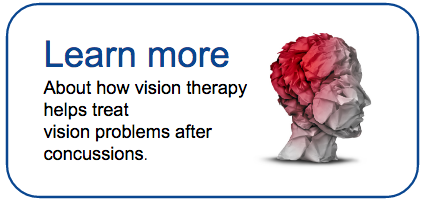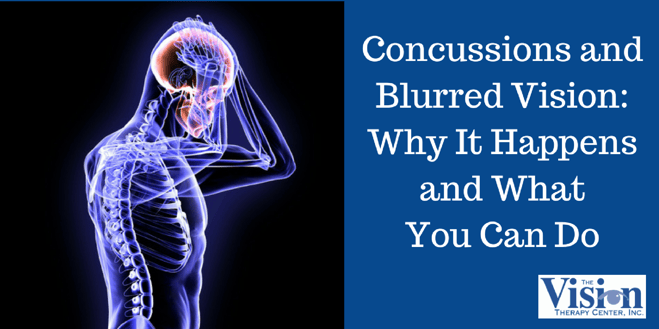
Concussions and blurred vision often go hand-in-hand. Because the visual system includes the eyes, brain and visual pathways, even a mild concussion can result in blurred vision. Let’s take a look at the causes, and what treatment steps you can take to relieve this symptom.
When a concussion occurs, there are different types of blurred vision that can result. Many of these can be treated through methods including prescription lens, syntonics and vision therapy.
Before we detail what steps can be taken to relieve blurry vision, let’s examine how functional vision works, and why the functional visual skill affects your ability to focus.
Eye Focusing: The Visual Skill Associated With Blurry Vision After a Concussion
First, let’s define what we mean by functional vision.
Functional vision is how your entire visual system -- the eyes, the brain, the visual pathways -- work together to help you interact with your environment. Functional vision includes the visual skills eye movement, eye teaming and eye focusing.
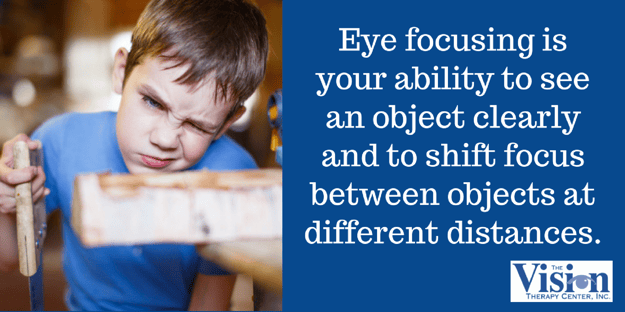
In the case of blurry vision after a concussion, the visual skill that’s typically affected is eye focusing. Eye focusing encompasses your ability to see an object clearly and to shift focus between objects at different distances.
Blurred Vision From a Concussion Occurs in Many Different Ways
When the eye focusing visual skill is affected, the blurred vision may occur in many different ways. You may:
- Have difficulty keeping reading material in focus
- Experience intermittent or constant blur
- See the text in a book clearly (in a classroom setting) but have difficulty shifting focus from the book to board and back
So what can you do to alleviate the symptoms and restore your visual skills?
Head Injury and Blurred Vision: Rest First
Before we get to some of the methods developmental optometrists use to alleviate blurry vision, remember that you’ve just had a head injury. If swelling or inflammation has occurred, you need to let the injury heal.
Sometimes the blurred vision will improve as the swelling or inflammation is reduced through the healing process. With less pressure from the swelling, the area in the brain that controls the eye focusing skill may be able to function normally again.
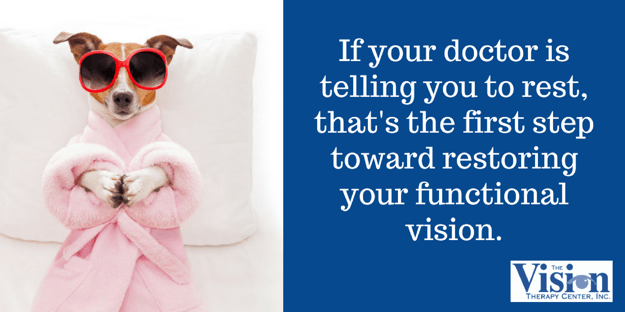
If your doctor is telling you to stay home and rest, that will be the first step toward restoring your functional vision. But if you’ve resumed normal activity and you still are experiencing blurred vision, then it’s time to see a developmental optometrist.
How Developmental Optometrists Treat Concussion and Blurred Vision Symptoms
Developmental optometrists specialize in functional vision. For cases such as vision problems from traumatic head injuries, primary care optometrists will refer patients to a developmental optometrist. The diagnosis and treatment process typically follows these steps:
Step 1: Conduct a functional vision test
A functional vision test includes more than testing to see if your eyesight is 20/20. A developmental optometrist will test all three of the visual skill areas that make up functional vision. In some cases, all three visual skill areas may be affected, which is why this comprehensive test is required.
Step 2: Develop a plan for treatment
Based on the functional vision exam results, a treatment plan may include one or all of the following areas:
Prescription lens: In some cases, lenses alone can help improve or eliminate the blurry vision that can result from a concussion. In other cases, a combination of lenses and therapy, or therapy alone, will be the preferred treatment.
Syntonics: Syntonics involves the use of light therapy to treat functional vision problems. It helps restore balance to the autonomic nervous system, as explained in this article on syntonic phototherapy.
In this video, Dr. Kellye Knueppel explains how it works, and how it has improved the visual skills of patients.
Vision therapy: Through an individualized program of exercises and activities to improve how you use your vision, you can improve the affected visual skill areas. The length of the vision therapy program will vary depending on the extent to which the person’s functional vision is affected.
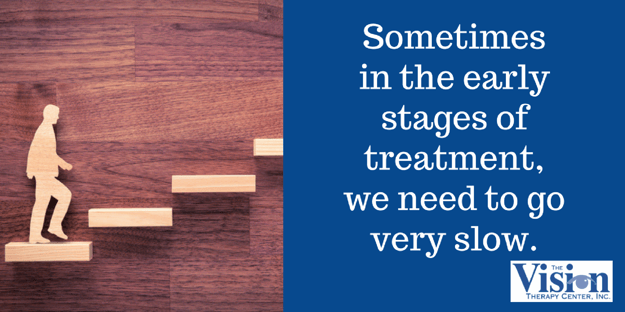
A treatment plan is geared to where the patient is in the recovery phase. Sometimes in the early stages, we need to go very slow -- perhaps starting out with syntonics treatment alone, or simply a lens prescription.
It should also be noted that in some cases, the concussion may have caused permanent injury to the area of the brain that controls eye focusing. In these cases, these treatments may not alleviate the blurred vision. However, the treatments may help the patient compensate for the loss by maximizing the efficiency of their other visual skills.
Separating Pre-existing Vision Problems From Concussion-induced Problems
It should be noted that if you had a functional vision problem before the injury, that issue may become more pronounced after the concussion.
In the same respect, we’ve had patients who had vision therapy and corrected a functional vision problem prior to a concussion. After the head injury, the vision problem returned.
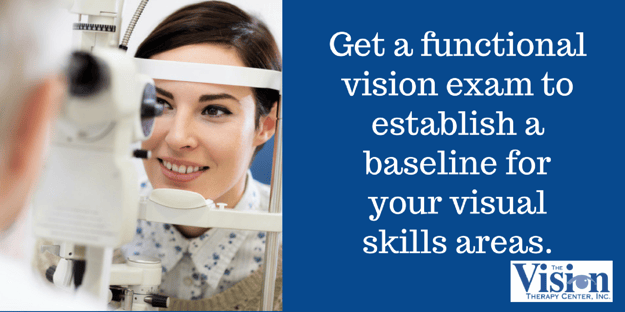
We strongly recommend that you have a functional vision exam as soon as possible to establish a baseline for your visual skill areas. In the event that you suffer a concussion, a comparison of your post-concussion functional vision exam to your baseline exam will help us to understand how the concussion has affected your functional vision.
Concussion Symptoms With Blurred Vision: How to Seek Out Treatment
Before you seek out treatment from a developmental optometrist, first consult with your doctor. We need to know that the swelling has subsided and is not impacting the area responsible for eye focusing. We also have to know if you’re ready to undergo treatment.
Once you have the green light, seek out a developmental optometrist, who specializes in functional vision problems. Here’s a link to find one in your area.
Learn more from our website page on vision and concussions. It includes success stories involving patients who have used vision therapy to overcome blurred vision and other symptoms.

